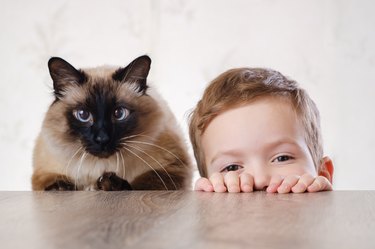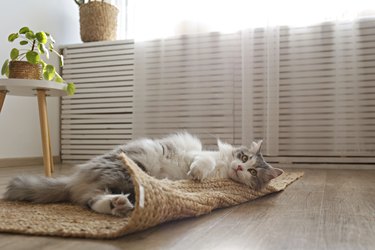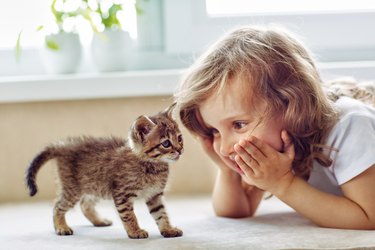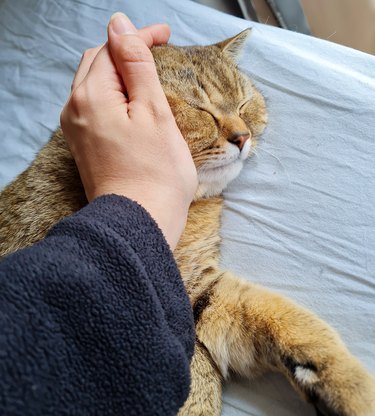When a child meets a new cat, they naturally have expectations — but cats don't always understand that a child is just trying to get to know them. A cat with an easygoing, flexible temperament who enjoys people is more likely to do well with kids. Some cats bounce back easily from loud or surprising noises, fast movements, and constant touching—all normal kid behavior, especially from little ones! Finding those well-rounded family pets is a treasure hunt, even for cat-savvy households. Other considerations like breed, personality, energy level, health, and cost are great clues in your search for kid-ready cats.

Video of the Day
Choosing the best cat breeds for kids
Scope out some of the spectacular ears and whiskers at the Cat Fancier Association's page on breeds. Look for breeds generally to be people-oriented. Balinese are known for being chatty — meaning lots of bubbly meowing — and could be a fun partner for outgoing kids. Perhaps you've known some ragdolls and want the same for your kids. Learning about breeds can also help you decide what won't work for your family.
Video of the Day
Fore instance, long-haired cats, such as Maine coons, require brushing to prevent hair matting, but young children aren't ready for delicate grooming. Your child's health could also be a consideration; for example your kid's heart may be set on a cat for a family pet but they have allergies. While no cat breeds are truly hypoallergenic, some, like the Sphinx, produce dander that is easier to manage.
Breeders aren't your only option. Occasionally, purebred cats do turn up at shelters, humane societies, and rescues — but you could be waiting a long time for them. So, if your children want a particular breed because it's cute, encourage them to be flexible. A gray domestic shorthair who has lived with children is easier to find than Korats or Russian blues. Your tween could hope for a fluffy Persian, but change their mind when a fun and friendly tuxedo cat hops onto their lap. Choose chemistry over cuteness, because a breed's reputation won't guarantee a cat's willingness to tolerate the attention from children of any age.

Aligning personalities with family members
It is best when a cat's personality lines up with your child's temperament. Think about your kid's personality and what they want to do with your new family member.
- Your child has a lot of love to give: Super affectionate cats who seek attention are more likely to appreciate a doting child. Look for the snuggle bug cats constantly underfoot because they want to be picked up, or the biscuit-makers who will meow at your child's bedroom door.
- Your child doesn't slow down: Some cats are highly energetic and natural comedians. Children who want to engage cats with toys and games will appreciate higher-energy cats.
- Your child is more easygoing: Some cats like affection but don't want to be petted or picked up all the time. They can handle busy households and tuck themselves away when they need to. Kids who are more independent will also appreciate a more independent cat who doesn't need attention every minute.

Kittens come with caveats
Kittens are adorable and delightful — they even have their own season! Kittens seem like the easy choice for young children because they can grow up together. But children can overwhelm kittens by handling them too roughly, which can mean they won't bond the way you had hoped. Socializing and training kittens relies on gentle handling and positive reinforcement.
Plus, kittens are highly energetic. They climb curtains and climb up pants legs with very sharp claws, and pounce on sleeping feet. Not all children will enjoy that. If a child does love their energy, they must interact with kittens in productive ways that don't encourage biting or scratching. Be prepared to teach your child about being gentle and respectful.

Factor in the cost of family pets
Vaccines, regular exams, flea treatment, and parasite prevention are regular veterinarian costs. Pet health insurance is an additional cost but a great investment. Ongoing costs of bringing a new cat into the home are food and litter, of course. When first getting a cat, you'll be purchasing additional supplies, including toys, a litter box, a scratching post, and bedding.
If a cat has or develops a medical condition, that could require more of your time and possibly expensive treatments. If a cat has a condition that is exacerbated by stress, they could struggle around high-energy toddlers. Consider what is best for the cat—and that it is okay to want a low-maintenance cat.

In summary
Most kids want a cat they feel naturally drawn to, who is just as interested in them. Talk with your child about what that looks like for them. Educate your kids on feline body language so they can interact gently with any cat by following a cat's clues to keep everyone purring along. Learn about positive reinforcement together. Be excited and get ready, because when you meet potential cat companions, the cats will tell you if your children are the best "type" for them!